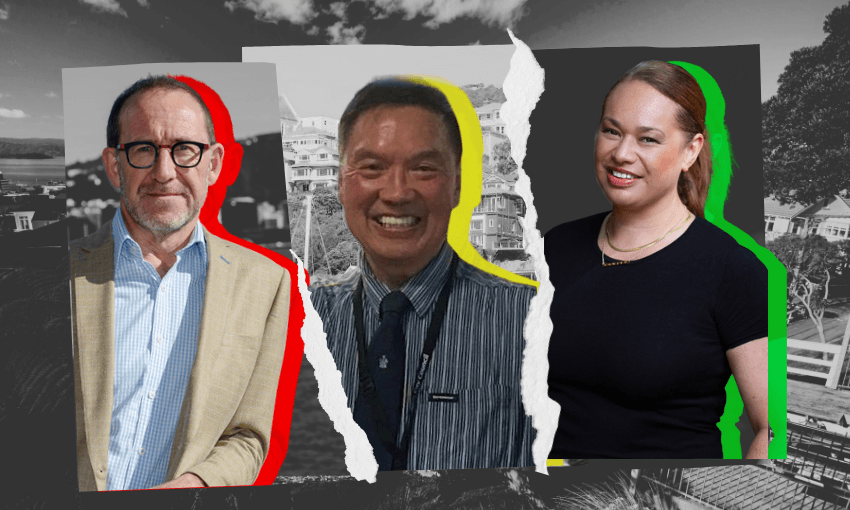The former Labour leader’s entry into the race makes life more difficult for Tory Whanau, but there are silver linings for her campaign.
Andrew Little launched his campaign, a new political party insisted it wasn’t a political party, and the Greens found a new star candidate. It’s been a big week of local political news in Wellington, so let’s break down what it means for the October election.
A new frontrunner emerges
Andrew Little, former Labour Party leader and senior minister in the Ardern/Hipkins government, officially entered the mayoral race on Wednesday and instantly became the frontrunner. He’s well-known, well-respected, and has been well-received by broad swathes of the electorate. His opening round of media appearances went smoothly; he seemed confident and assured, a stark contrast to incumbent Tory Whanau, who has often struggled in live interviews.
As the Greens have grown stronger locally, they’ve staked out the strongest position on transformative urbanist policies like high-density housing, cycleways and pedestrian streets. That created an interesting question about how Labour would differentiate itself. Little’s rhetoric so far shows a clear focus on community facilities. He’s highlighted Begonia House, Khandallah Pool and Karori Community Centre – all of which are problematic money pits but popular with local residents. It’s a good political move to target voters in suburban areas, even if the financial equation is questionable.
He’s positioned himself slightly to Whanau’s right on some big issues. He supports bike lanes but wants to take a tentative approach with more consultation, and said he would rephase parts of the Golden Mile upgrade. This isn’t as controversial as it sounds – the council has already voted to focus on the Courtenay Place section first; it makes no sense to have construction on Lambton Quay until after the Te Ngākau Civic Square rebuild is complete.
Little has taken a read of the electorate and senses there is a desire for a slightly more measured approach, and his “adult in the room” reputation meets the moment. However, that position has risks too. Just look at Paul Eagle’s campaign in 2022. Like Little, Eagle was a former Labour MP with an “adult in the room” reputation, but his campaign faltered, and he finished a distant third. Eagle focused too much time and energy on courting centre-right swing voters, and offered little for the left to get excited about.
Little is a far more competent and successful politician than Eagle ever was, and he’s actively seeking the Labour endorsement, while Eagle pitched himself as an independent. Little has genuine progressive bona fides – his key to victory will be to lean into them, not shy away from them.
Whanau’s narrow path to victory
Little’s entry into the race makes life more difficult for Tory Whanau, but there are silver linings for her campaign. The key thing to remember is that Wellington City uses a single transferable vote (STV) system, not first past the post (FPP).
Whanau will hope most progressive voters are broadly happy with either her or Little as mayor, but that enough of them will rank her first and Little second. With Little taking moderate positions on some big issues, Whanau has an open lane to run to his left. Even though she is the incumbent, she can claim the ground as the candidate with the boldest progressive agenda.
Little also acts as a defensive barrier. This is going to be a particularly ugly campaign. Better Wellington, the rightwing campaign group with connections to the anti-vax, anti-trans and pro-whaling (yes, really) movements, has an enormous war chest and is more than willing to fight dirty. If there were no Labour candidate, Whanau would have borne the full brunt of their attacks. Now, they’ll have to split their focus.
Lastly, Whanau would much rather lose to Andrew Little than Ray Chung. So even if it doesn’t go her way, she’ll take solace in that.
A party of oxymorons
Ray Chung, the conservative councillor who announced his mayoral run early last year, has staked his ground as the leading candidate on the right. Last week, he revealed his campaign ticket, Independent Together, or IT, with 10 council candidates (two in each general ward), all of whom would be first-time councillors.
Better Wellington immediately threw its support behind Independent Together, and Chung has been hosting big-money fundraising luncheons at the Wellington Club, so it’ll have plenty of money to maintain a high profile.
The oxymoronic name seems to have come about because polling suggested voters oppose party politics on council, so the group is trying to claim to be “independent” despite having shared policies, branding, and all the other hallmarks of political parties. As Dave Armstrong put it in The Post, “some of our thinkers are so independent that they join with other like-minded independent thinkers and form groups of independent thinkers who all think exactly the same way.”
Independent Together is campaigning on a promise of zero rates increases for the next three years. It’ll be an appealing pitch for many, but it would require drastic cuts across the board, and the group hasn’t yet explained how they would make the numbers work.
The key for Independent Together will be to contain some of their more extremist qualities and maintain a veneer of seriousness. Chung can be a bit of a loose cannon – last week, he described the mayor as “full of shit” in an interview with Newstalk ZB’s Ethan Manera, before trying to walk back his comments.
Better Wellington, meanwhile, has been preoccupied with drag queens performing in libraries and scaremongering about the council allowing mosques to play the call to prayer. Its opening attack against Little was to post a photo of him standing next to Jacinda Ardern. These issues might get a lot of engagement on social media, but the dark corners of X/Twitter aren’t particularly reflective of the median Wellington City voter.
The Greens swing a coup
Recently, I covered the saga of Rebecca Matthews, the Onslow-Western ward councillor and prominent housing advocate who appears to have been frozen out of the Labour Party. Matthews applied to run for a third term as a Labour-endorsed independent candidate if no other candidate was found. However, the party opted for a fully party-affiliated candidate: Joy Gribben, a former press secretary in the Ardern government.
Almost immediately after the news went public, the Green Party started making moves to recruit her. “I am trying to poach Rebecca for our team,” Tory Whanau told The Spinoff. “We’d be lucky to have her and I would welcome her with open arms.”
Matthews confirmed to The Spinoff that she intended to seek the Green Party nomination in Onslow-Western. “I don’t have any beef with Labour. My beef is with Nimbies who are resistant to positive change and the belief that Wellington cannot evolve,” she said. “The status quo is simply insufficient for our city’s needs. The leafy suburbs also deserve a representative who champions sustainability and fairness. I intend to make a strong case to voters to vote me, and the Green Party’s focus on the future of the city, back in,” she said.
“While I look forward to learning more about Andrew Little’s vision for Wellington, I’ve had the privilege of working alongside Tory Whanau and witnessing her leadership firsthand. I will confidently give her my first preference vote. I believe in her continued ability to guide our city forward.”
There are four Greens on council, two of whom are fairly safe bets for re-election: Laurie Foon in the southern ward and Geordie Rogers in Lambton. However, Māori ward councillor Nīkau Wi Neera and mayor Tory Whanau are in more vulnerable positions. If Matthews can hold her seat, it will make a big difference to the voice the party wields in the next triennium.


